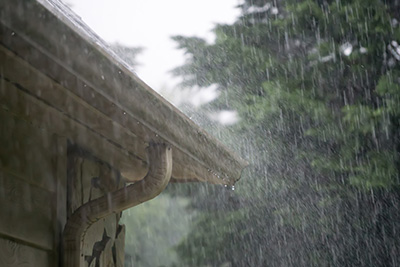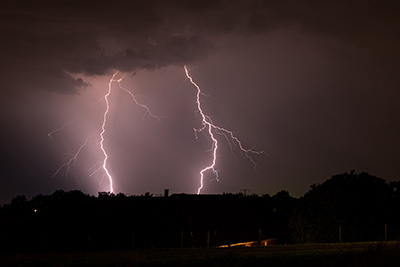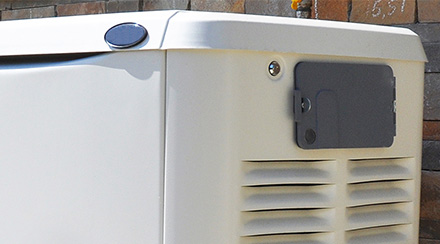How to Prepare for Severe Storms – and Recover After

Severe weather has always been a danger to life and property – and with a boost from steadily warming temperatures, these weather events are growing increasingly destructive. But there’s a lot you can do to prepare for severe storms, even if they arrive unexpectedly.
First, let’s take a quick look at how these storms work and how you can stay safe from their most dangerous effects.
Preparing for a Storm
Severe storms can develop quickly, so preparation is key, especially if a power outage occurs. It’s best to perform these steps early, when conditions are calm.
- Identify your home’s most secure storm shelter, usually a basement or a windowless, interior room like a closet or bathroom.
- Create a family emergency communication plan so that you can connect with your loved ones when weather emergencies occur.
- Prepare an emergency kit that includes a store of nonperishable food, bottled water (one gallon per person, per day), batteries, flashlights and a first aid kit. For more connectivity, include a battery-operated emergency weather radio and a portable solar charger for your mobile devices.
- Use surge protection power strips and adapters throughout your home to protect against power surge damage, or install a whole-home surge protection system.
- In case a storm causes a power outage, advance planning is key when choosing a generator to power your home.
When a Storm Is Imminent
- Secure lawn furniture, flags, potted plants and other outdoor objects that could be blown away or damaged by a powerful storm.
- Unplug any sensitive electronics that are vulnerable to power surge damage, unless they are otherwise protected by a surge protector.
- Shelter in a secure structure until the storm has passed. Use a weather radio or internet-connected device to confirm that the storm system has completely passed before stepping outside.
- If the power goes out, keep the refrigerator and freezer closed. The residual cold air will keep your food safe for several hours without power if you do not open the door.
After the Storm
- Carefully check for damage to your home’s exterior, roof, windows and yard. Be especially cautious about downed power lines and broken branches that could fall from trees. If you see downed power lines, go back inside and call your local electrical utility or police department to report the damage. You should treat all downed power lines as active and dangerous.
- If you find damage to your home, take photos and contact your homeowners insurance company at your earliest opportunity. Storm damage may be covered, and your documentation can make it easier to file a claim.
- If you experience a power outage, make a plan to dispose of the contents of your refrigerator and freezer if necessary. If you keep the doors closed during the power outage, food will stay safe in the refrigerator for four hours. Frozen food will stay safe for 24 hours in a half-full freezer and 48 hours in a full freezer. Do not take a chance with perishable food that has been too warm for too long.
- When using a generator to power your home or appliances during a power outage, be sure to follow all safety instructions. Fuel-burning generators must be placed at least 20 feet away from your home, in a well ventilated area, to avoid the risk of carbon monoxide poisoning.
- Replenish any items you used from your emergency kit.

Lightning Safety
Lightning strikes can be destructive and deadly. When lightning strikes structures or utility lines, it can start fires, cause physical damage, temporarily electrify surfaces and damage appliances and electronics by causing power surges. When lightning strikes people, it can cause death, cardiac arrest, burns and several other short- and long-term medical issues.
What is lightning?
Lightning is a sudden discharge of electricity that occurs after a significant buildup of oppositely charged particles within a storm cloud. Moments after a lightning strike, you may hear thunder.
What attracts lightning?
Contrary to popular belief, metal does not attract lightning – it’s merely a good conductor of electricity. Lightning strikes are actually attracted to tall, isolated structures, especially if they have a pointy shape. Lightning rods designed to safely attract lightning are effective not because they are metallic, but because they are the highest point in a given area.
If you hear thunder or see a thunderstorm warning reported by local media, you should stay indoors whenever possible. If you cannot get indoors immediately, avoid tall or isolated structures, which can include trees and utility poles. When lightning strikes a person, paramedics should be called immediately. CPR should be administered, when possible, if the person is unresponsive.
What happens if lightning strikes your house?
While rare, these strikes can occur, potentially causing instantaneous structure fires and damage, even to nonflammable materials like brick, concrete and stone. The immediate risk in these instances is of spreading fire or structural instability. Call 911 immediately and leave your home to seek nearby shelter if an out-of-control fire starts.
As a secondary concern, a lightning strike can cause severe power surge damage if it travels through the wiring of your home. This can be especially damaging to sensitive electronics like computers, televisions and handheld gadgets, but may also damage major appliances like refrigerators, washers, dryers, dishwashers and ovens. A severe power surge may even damage your home’s wiring and circuitry itself.
Wind Safety
In addition to lightning strikes, strong winds can cause damage and add to the danger during storm conditions. The National Weather Service issues a variety of alerts to warn of dangerous winds, including:
- High wind watch - Strong, sustained winds are possible
- High wind warning - Strong, sustained winds with stronger gusts are occurring
- Wind advisory - Same as a high wind warning, but with slower wind speeds
- Severe thunderstorm watch - A severe thunderstorm capable of producing 58 mph winds or faster is possible
- Severe thunderstorm warning - A severe thunderstorm capable of producing 58 mph winds or faster is occurring or imminent
- Hurricane force wind/gale warnings - Issued in coastal regions when high winds are predicted
- Dust storm warning - Issued when visibility is reduced to half a mile or less due to blowing dust or sand from sustained or gusting winds
When strong winds are predicted, you should prepare by bringing pets and children indoors, securing loose or lightweight objects that are outdoors on your property and storing your vehicles in a garage, if possible. While strong winds are ongoing, stay inside whenever possible and reduce your speed if driving. If you see downed power lines, you should call your local police or electrical utility to report the damage while avoiding the area.
Looking for Something Specific?
Select a category to find resources for topics that interest you.
Select Category

Related Articles:

What to Do Before, During and After Power Outages
With a little knowledge and preparation, you can protect yourself, your home and your belongings during power outages of any duration.
Read Article
How to Choose a Generator for Your Home
Power outages can be miserable, but with the right generator, you can keep your family safe and comfortable until power is restored. Learn how to choose the best generator for your home.
Read Article
Weatherize Your Home for Summer
The extreme heat of summer can really do a number on your energy bills. But if you’re able to invest a little time and money into weatherizing to keep your home cool, you can help yourself and your family remain comfortable at home while still saving energy.
Read ArticleMost Popular Articles

Energy Plans to Fit Your Lifestyle
NRG offers electricity and natural gas plans with perks like cash back, travel rewards and more, so you can find a plan that fits your home and family.
How to Prepare for Severe Storms – and Recover After
Severe weather has always been a danger to life and property – and with a boost from steadily warming temperatures, these weather events are growing increasingly destructive. But there’s a lot you can do to prepare for severe storms, even if they arrive unexpectedly.
First, let’s take a quick look at how these storms work and how you can stay safe from their most dangerous effects.
Preparing for a Storm
Severe storms can develop quickly, so preparation is key, especially if a power outage occurs. It’s best to perform these steps early, when conditions are calm.
- Identify your home’s most secure storm shelter, usually a basement or a windowless, interior room like a closet or bathroom.
- Create a family emergency communication plan so that you can connect with your loved ones when weather emergencies occur.
- Prepare an emergency kit that includes a store of nonperishable food, bottled water (one gallon per person, per day), batteries, flashlights and a first aid kit. For more connectivity, include a battery-operated emergency weather radio and a portable solar charger for your mobile devices.
- Use surge protection power strips and adapters throughout your home to protect against power surge damage, or install a whole-home surge protection system.
- In case a storm causes a power outage, advance planning is key when choosing a generator to power your home.
When a Storm Is Imminent
- Secure lawn furniture, flags, potted plants and other outdoor objects that could be blown away or damaged by a powerful storm.
- Unplug any sensitive electronics that are vulnerable to power surge damage, unless they are otherwise protected by a surge protector.
- Shelter in a secure structure until the storm has passed. Use a weather radio or internet-connected device to confirm that the storm system has completely passed before stepping outside.
- If the power goes out, keep the refrigerator and freezer closed. The residual cold air will keep your food safe for several hours without power if you do not open the door.
After the Storm
- Carefully check for damage to your home’s exterior, roof, windows and yard. Be especially cautious about downed power lines and broken branches that could fall from trees. If you see downed power lines, go back inside and call your local electrical utility or police department to report the damage. You should treat all downed power lines as active and dangerous.
- If you find damage to your home, take photos and contact your homeowners insurance company at your earliest opportunity. Storm damage may be covered, and your documentation can make it easier to file a claim.
- If you experience a power outage, make a plan to dispose of the contents of your refrigerator and freezer if necessary. If you keep the doors closed during the power outage, food will stay safe in the refrigerator for four hours. Frozen food will stay safe for 24 hours in a half-full freezer and 48 hours in a full freezer. Do not take a chance with perishable food that has been too warm for too long.
- When using a generator to power your home or appliances during a power outage, be sure to follow all safety instructions. Fuel-burning generators must be placed at least 20 feet away from your home, in a well ventilated area, to avoid the risk of carbon monoxide poisoning.
- Replenish any items you used from your emergency kit.
Lightning Safety
Lightning strikes can be destructive and deadly. When lightning strikes structures or utility lines, it can start fires, cause physical damage, temporarily electrify surfaces and damage appliances and electronics by causing power surges. When lightning strikes people, it can cause death, cardiac arrest, burns and several other short- and long-term medical issues.
What is lightning?
Lightning is a sudden discharge of electricity that occurs after a significant buildup of oppositely charged particles within a storm cloud. Moments after a lightning strike, you may hear thunder.
What attracts lightning?
Contrary to popular belief, metal does not attract lightning – it’s merely a good conductor of electricity. Lightning strikes are actually attracted to tall, isolated structures, especially if they have a pointy shape. Lightning rods designed to safely attract lightning are effective not because they are metallic, but because they are the highest point in a given area.
If you hear thunder or see a thunderstorm warning reported by local media, you should stay indoors whenever possible. If you cannot get indoors immediately, avoid tall or isolated structures, which can include trees and utility poles. When lightning strikes a person, paramedics should be called immediately. CPR should be administered, when possible, if the person is unresponsive.
What happens if lightning strikes your house?
While rare, these strikes can occur, potentially causing instantaneous structure fires and damage, even to nonflammable materials like brick, concrete and stone. The immediate risk in these instances is of spreading fire or structural instability. Call 911 immediately and leave your home to seek nearby shelter if an out-of-control fire starts.
As a secondary concern, a lightning strike can cause severe power surge damage if it travels through the wiring of your home. This can be especially damaging to sensitive electronics like computers, televisions and handheld gadgets, but may also damage major appliances like refrigerators, washers, dryers, dishwashers and ovens. A severe power surge may even damage your home’s wiring and circuitry itself.
Wind Safety
In addition to lightning strikes, strong winds can cause damage and add to the danger during storm conditions. The National Weather Service issues a variety of alerts to warn of dangerous winds, including:
- High wind watch - Strong, sustained winds are possible
- High wind warning - Strong, sustained winds with stronger gusts are occurring
- Wind advisory - Same as a high wind warning, but with slower wind speeds
- Severe thunderstorm watch - A severe thunderstorm capable of producing 58 mph winds or faster is possible
- Severe thunderstorm warning - A severe thunderstorm capable of producing 58 mph winds or faster is occurring or imminent
- Hurricane force wind/gale warnings - Issued in coastal regions when high winds are predicted
- Dust storm warning - Issued when visibility is reduced to half a mile or less due to blowing dust or sand from sustained or gusting winds
When strong winds are predicted, you should prepare by bringing pets and children indoors, securing loose or lightweight objects that are outdoors on your property and storing your vehicles in a garage, if possible. While strong winds are ongoing, stay inside whenever possible and reduce your speed if driving. If you see downed power lines, you should call your local police or electrical utility to report the damage while avoiding the area.
Looking for Something Specific?
Select a category to find resources for topics that interest you.
Select Category

Related Articles:

What to Do Before, During and After Power Outages
With a little knowledge and preparation, you can protect yourself, your home and your belongings during power outages of any duration.
Read Article
How to Choose a Generator for Your Home
Power outages can be miserable, but with the right generator, you can keep your family safe and comfortable until power is restored. Learn how to choose the best generator for your home.
Read Article
Weatherize Your Home for Summer
The extreme heat of summer can really do a number on your energy bills. But if you’re able to invest a little time and money into weatherizing to keep your home cool, you can help yourself and your family remain comfortable at home while still saving energy.
Read ArticleMost Popular Articles

Energy Plans to Fit Your Lifestyle
NRG offers electricity and natural gas plans with perks like cash back, travel rewards and more, so you can find a plan that fits your home and family.







